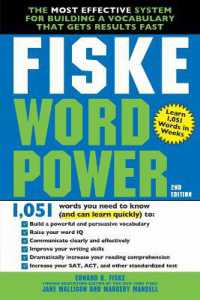Full Description
"Liberal universality" is the dominant framework of human rights in the literature. This paradigm asserts that human rights norms must be interpreted by prioritizing individualism, secularism, and autonomy in all spheres of life. According to this perspective, religiously grounded and duty-oriented visions should not be part of human rights standards, and in some cases, they must be excluded from international debates. This situation is due to a lack of academic scrutiny of the difference between human rights as internationally recognized norms and human rights standards or interpretations as developed by international mechanisms through this paradigm. The case study of the current development of sexual and reproductive health and rights reveals key problems with this interpretative framework: its questionable neutrality, its reduced notion of viewpoint diversity, and its top-down approach that disregards people's real concerns. This book proposes to go back to basics by rediscovering the notion of "pluralistic universality" of the Universal Declaration of Human Rights of 1948, which welcomes interdependent and religiously grounded worldviews that are more compatible with non-Western cultures and some Western traditions. In this sense, the book encourages a redefinition of the universality of human rights in the light of the right to self-determination, as a tool to foster bottom-up approaches, intercultural dialogue, and global consensus for the development of universally acceptable human rights standards. In this way, these standards will enjoy greater legitimacy because they will reflect an international agreement that is responsive to local realities and one that accepts reasonable disagreement in controversial issues.
The increasing number of voices questioning the legitimacy of the implementation of human rights will lead to a widespread loss of faith in the concept of human right itself. Reverting this tendency is an urgent task that reveals the gap between the norms ruling the monitoring bodies and their actual performance. In accepting this challenge, this book will be a necessary source of study for anyone concerned with the purpose and practice of human rights.
—Pilar Zambrano, University of Navarra
An original and fruitful approach to human rights, analyzing the ideology behind different interpretations, in particular the dogmatic Western liberal version. An excellent and important work.
—Éric Wyler, Université Paris II Panthéon-Assas
Contents
Acknowledgments - List of Abbreviations - Introduction - The Universality of Human Rights Standards: Analyzing the Interpretative Framework - SRHR in International Law: Consensus or Conflict? - The Impact of Liberal Universality on People's Lives - The Pluralistic Universality of the UDHR - The Interpretation and Implementation of the UDHR - The Right to Self- determination: Pluralistic Universality in Action - Conclusions: Towards a Change of Interpretative Paradigm - Bibliography - Index of Authorities.







